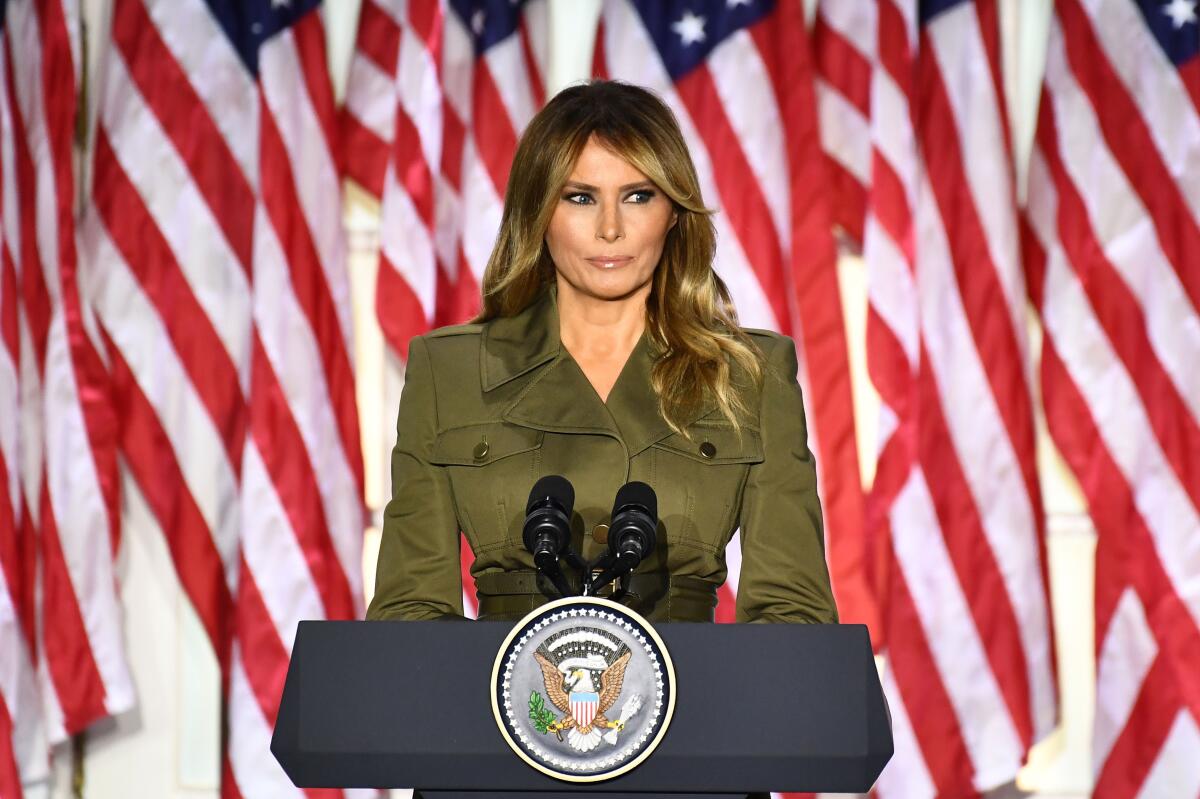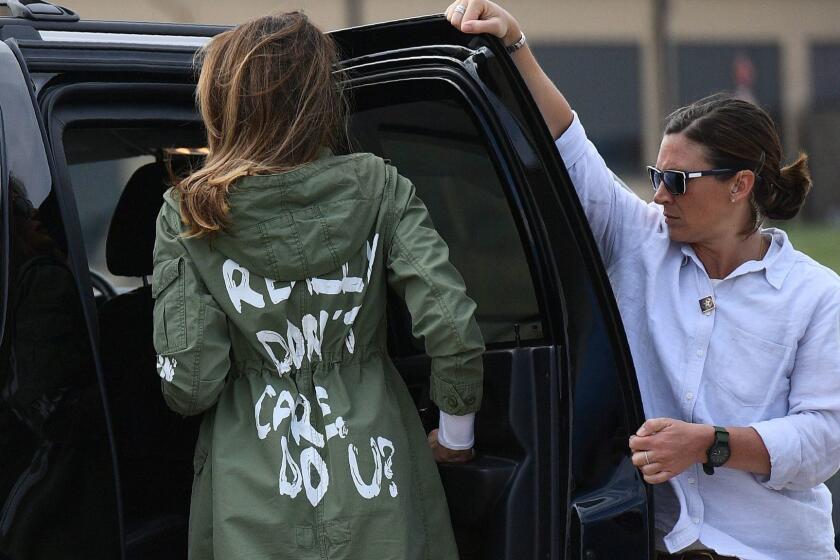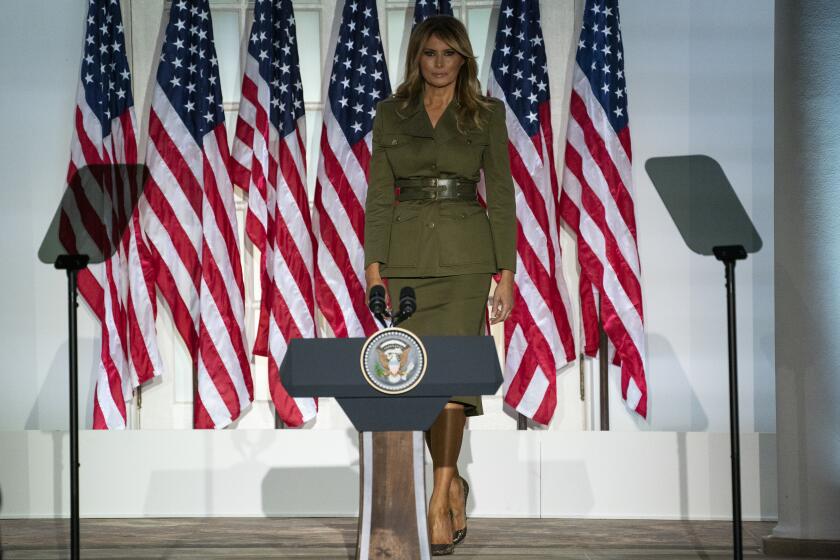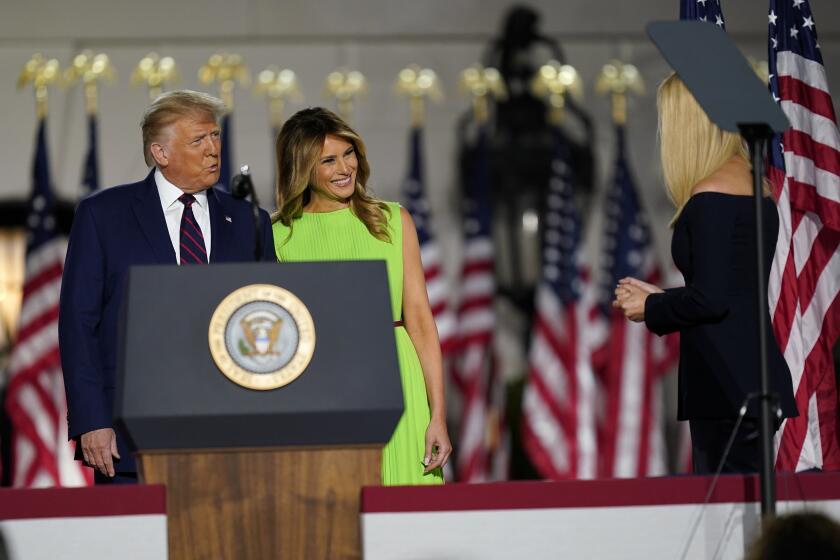Column: Stop treating Melania Trump as an enigma. She’s a bare-knuckled political player

It’s tough to maintain an air of mystery in the year of “I can’t breathe,” a mantra for protests over racist police brutality that could also apply to the almost 200,000 Americans who have died from COVID-19.
Still, you have to hand it to Melania Trump. Enigmatic is not an easy brand for any public figure to maintain these days, when every phone is a camera, an editing bay and a research library, when the most popular form of exercise is the knee-jerk reaction.
Given her current habitat — a White House where the turnover rate is almost as high as the indictment rate — and her spouse, a president who has leveraged television and social media better than any American who is not a Kardashian, it must have taken an iron will to remain a cipher for so long.
For almost four years, she has been a Sphinx-like figure, granting few interviews, making few public speeches and generally forcing the American public to parse her every move (and, during the early months of the Trump administration, which she chose to spend in New York, non-move), outfit, heel height, gesture, facial expression and physical-distance-from-president choice for clues. Clues to the state of her marriage, her politics, her emotional well-being, even her personal safety.
Every first lady endures a certain level of scrutiny, a weighted seesaw of criticism and praise — where some saw Jackie Kennedy as a fashion icon, others considered her an elitist spendthrift; ditto Nancy Reagan. And many in the role struggle with the confines of daily life; Michelle Obama famously told Stephen Colbert that she just wanted to be able to open a window.
But has any other first lady been disdained by some as a gold-digger and pitied by others as a steely-eyed sufferer? Has there ever been a first lady who generated even half-serious concerns — #FreeMelania — that she was being held in the White House against her will?
No, my friends, there has not.
Stephanie Winston Wolkoff, who organized Trump’s first inauguration, gave her all to a first lady she says was happy to toss her under the bus.
Now, however, those days of uncertainty are over. Whether by strategy, necessity or simply the inexorable nature of time, Melania has become a player. For the last few months, she’s been at the center of various news cycles, and not in the previous “why is she wearing stilettos to visit hurricane victims?” kind of way.
She became the first, and really only, Trump to encourage the public to wear masks and follow CDC guidelines. She unveiled her redesigned Rose Garden; made the most universally well-received speech of the Republican National Convention; was the subject of two not very flattering books, including one by a former close friend and advisor; and joined her husband in tweeting a rejection of an Atlantic story in which anonymous sources offered accounts of the president saying terrible things about veterans.
“.@TheAtlantic story is not true ... This is not journalism — It is activism,” she wrote, leaping headlong into the ongoing social media maelstrom about the relative mendacity of the president and the media with all its inevitable lash and backlash.
Garbo speaks! And, with the notable exception of actually mentioning the scourges of racism and coronavirus currently plaguing our country during her RNC speech, she is not saying anything different from her husband and his supporters.
This should come as no surprise to anyone — she is First Lady Melania Trump after all, was a vocal partner in her husband’s ongoing and unfounded charges that Barack Obama was not an American citizen, and quite candid in her 2017 interview with Anderson Cooper that she could not understand why anyone would feel sorry for her.
Nor should any jaws drop at the revelation that she stayed in New York for the first five months of her husband’s administration, at great cost to the American taxpayers, because she wanted to renegotiate her pre-nup and didn’t want to move into the White House until the residence had been renovated. Or at any of the other details of a life organized around self-centered convenience and a “what, me worry?” attitude disclosed in both Mary Jordan’s “The Art of Her Deal: The Untold Story of Melania Trump” and Stephanie Winston Wolkoff’s “Melania and Me: The Rise and Fall of My Friendship With the First Lady.”
“Melania and Me: The Rise and Fall of My Friendship With the First Lady,” published this week, reveals insights into inauguration and the first lady’s psyche.
The books are very different in tone and purpose. The first, by a Pulitzer Prize-winning journalist, is a reported primer about Melania’s influential role in the Trump administration; the second, by an event planner who was made a scapegoat in the ongoing investigation into spending by Trump’s inaugural committee, is a self-pitying account of a power “friendship” gone sour.
So it is rather remarkable that the Melania who emerges from both is virtually the same — single-minded, non-forthcoming, focused on getting what she wants, be it a ban on flavored nicotine products or blocking Ivanka from key swearing-in photos.
There is, of course, a lot of flexibility allowed any first lady in terms of attitude and action. While the nation remains divided over President Trump’s understanding of his position as a public servant, he is one, while Melania is not. At least not legally. First lady is a position defined by tradition rather than the Constitution: She hosts various events, makes certain decisions about the running of the White House, supports social causes and represents the United States — with or without the president — on national and international occasions.
But, as Winston Wolkoff says she had to remind her friend several times when, pre-inauguration, Melania wanted to sign correspondence “First Lady Elect,” it is not an elected or codified role.
Over the years, that role has been as varied as the women who assumed the title. Some — Eleanor Roosevelt, Betty Ford, Hillary Clinton — were more openly involved in policy than others, but most have taken up causes including the arts (Jacqueline Kennedy), addiction (Nancy Reagan), literacy (Laura Bush) and childhood obesity (Michelle Obama). All served as host and companion — Pat Nixon is the most traveled first lady — though some kept a lower profile than others.
All publicly supported their husbands, politically and personally, through thick and thin, so any expectation that Melania would or should do otherwise was, and is, unfair and absurd.
Melania Trump sought to recast her husband’s image in an RNC speech that was often at odds with the hard-edged reality of the Trump presidency.
Melania Trump is an unusual first lady in many respects: She is only the second to have been born outside the United States (John Quincy Adams’ wife, Louisa, was born in London), and the first for whom English is not her first language. She had a career as a model when she married Donald — for the trivia-minded, the Trumps’ 24-year age gap is the third-largest the White House has seen, following John and Julia Tyler (30 years) and Grover and Frances Cleveland (28 years) — and she is the only first lady to be plagued by the nuisance of nude photographs being made public. She also may be the first to choose a cause — the fight against cyberbullying — that puts her in existential opposition to her husband, who is, by any standard you choose, a cyberbully.
More than that, though, she is, despite her past career, her attention-obsessed husband and obvious fashion sense, as uninterested in her public image as any first lady has ever been.
Or, more precisely, she is uninterested in the public’s image of her. Even before the now-infamous “I really don’t care. Do u?” jacket, which she wore en route to visit a children’s center on the Texas/Mexico border (she told ABC News it was a message to people and “the left-wing media” who were criticizing her), she made it clear, through both word and deed and lack of word or deed, that she did not care what people thought of her.
Indeed, much of Melania’s mystery emanated from her posture of detachment.
“I don’t care what people think” is usually a statement of defiance, often prefacing an action that will draw condemnation or derision. The person uttering it does in fact care what people think, at least enough to consider both the thought and the implication; she or he just decides to do what they want to do anyway.
For Melania the phrase appears to be simply a statement of fact.
Like Seymour Glass’ ill-fated new wife, Melania has always seemed like a woman “who for a ringing phone dropped exactly nothing.” When she was a model, that detachment was, in part, her job. But even after her husband entered politics, it apparently remained her go-to setting. According to Winston Wolkoff, whether the voice at the other end of that ringing phone related news that Melania had plagiarized Michelle Obama’s speech, or that her nude photos had surfaced or that her husband had bragged about assaulting women or that he had paid off the woman he had sex with in the weeks after Melania gave birth, Melania dropped exactly nothing.
Including and especially her guard. Every bit of news, Winston Wolkoff wrote, was met with variations of the same response — it’s the liberal media; it has happened before, will happen again; it doesn’t bother me.
Is it any wonder that a thousand memes have been launched in search of a flicker of real and conflicting emotion on the first lady’s face? The smile turned frown as soon as her husband’s back turns; the side-eye as Ivanka passes by at the RNC. No other first lady, not even Hillary Clinton or Pat Nixon, has gone through the nonstop, multi-level scandal cycle that has defined the Trump campaign and White House. But no weepy Barbara Walters interview for Melania. No sir. In the few interviews she has given over the years, she has blamed the media for any pain in her life and marriage, both of which she says are just fine.
She has, as she told her former friend repeatedly, a thick skin. And it shows.
Twitter is full of memes and questions after Melania Trump’s warm smile at Ivanka Trump instantly turned into a cold stare at the RNC on Thursday night.
Though Melania can flash a cover girl smile, it is not her default expression. Her face at rest is often stern and withdrawn, like a velvet curtain pulled closed. Her refusal to relax into the kind of interested head-nodding amiability that’s generally demanded of political wives, and indeed of most women, may be the thing I like best about her. If she hadn’t chosen cyberbullying as her cause, she could be an advocate for the resting bitch face, a warrior against all those who demand that women smile even when smiling is not remotely reflective of their mood or circumstances.
“I will smile when I decide it is time for me to smile,” Melania’s face often appears to say, and honestly, I’m all in for that. A woman’s face, even when it belongs to the first lady, is her own to do with what she will, memes be damned.
But.
But it is not OK for the first lady to not care what people think, at least not if she is going to represent the United States of America at home and abroad. She can disagree with what some or even all of what people think, can shrug off criticism as being political or sexist, really aimed at her husband, but she cannot define verifiable fact as public opinion (Trump did pay to silence Stormy Daniels and has made disparaging statements about John McCain and other veterans) and then dismiss public opinion out of hand.
Especially as she is entering into a much more explicit courting of the public, at least that part of the public inclined to vote for her husband. After four years of seeming indifference to her popularity, which has plummeted along with her husband’s, her sudden entrance into the traditional duties of first lady is an obvious necessity.
During much of Trump’s first term, Melania benefited from being considered the most “private” first lady in history. Let the public make wild surmises about how she really felt — there is freedom in being the object of speculative fascination and wary sympathy. In the early years of the Trump administration, many believed that Melania didn’t want to be first lady. There were rumors that she had planned to divorce her husband after he lost the election, that her decision to stay in New York would evolve into a permanent rejection of her duties; even after she moved to Washington, many believed she was there under duress and that she hoped he would not get reelected.
Now the public knows better. Many accounts reveal that she encouraged her husband to enter, and win, the race in 2016 and now, in full reelection gear, it is clear that Melania is very happy to be first lady, albeit on her own terms.
But circumstances have changed since 2016, and even since 2019, and — like her pre-nup — those terms must take that change into account. Melania is no longer a new kid in town. She may remain one of the most “private” first ladies in history, but the time of speculation has passed. The residence has been remodeled, the garden redone, the “Be Best” campaign launched, the books written. Whether she disagrees, as she has said, with some of the things her husband has posted on Twitter, she has been part and parcel of the Trump presidency for four contentious and eventful years.
She can remain detached, but she is no longer unknowable. The enigma has been cracked, and the reveal is really no surprise — Melania Trump, like many of us, is a person who wants what she wants. And she wants her husband to remain president for another four years.
What more does anyone need to know?
More to Read
The biggest entertainment stories
Get our big stories about Hollywood, film, television, music, arts, culture and more right in your inbox as soon as they publish.
You may occasionally receive promotional content from the Los Angeles Times.














